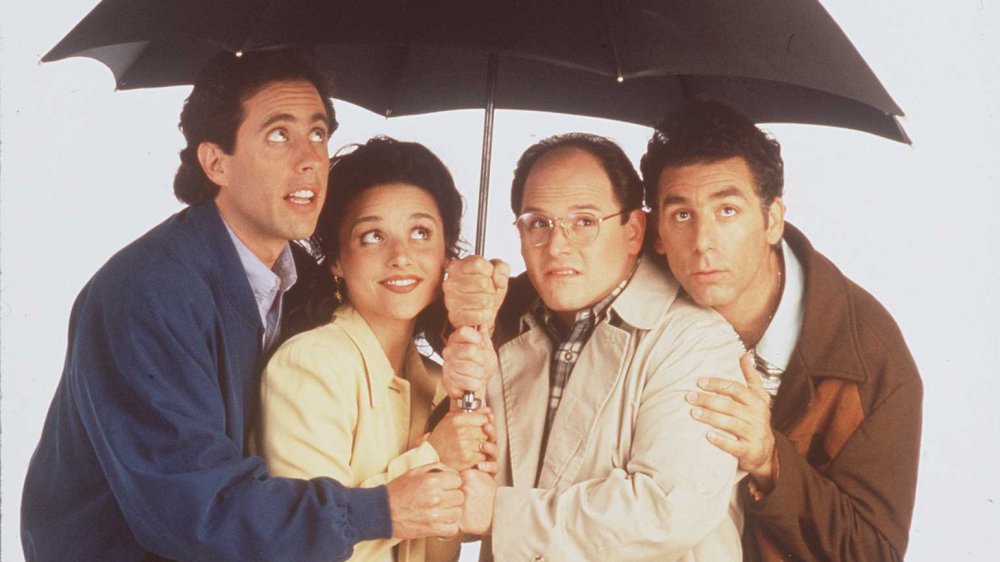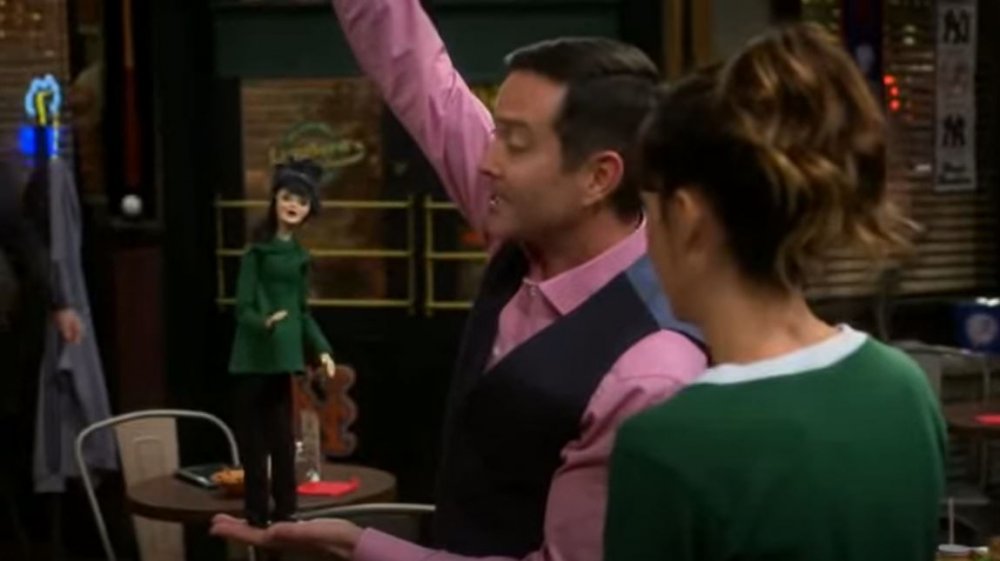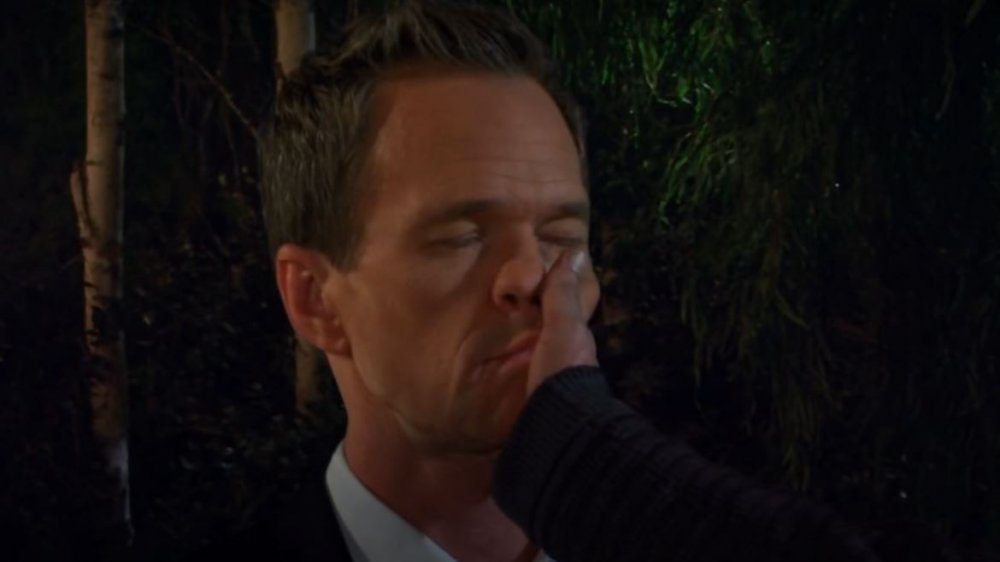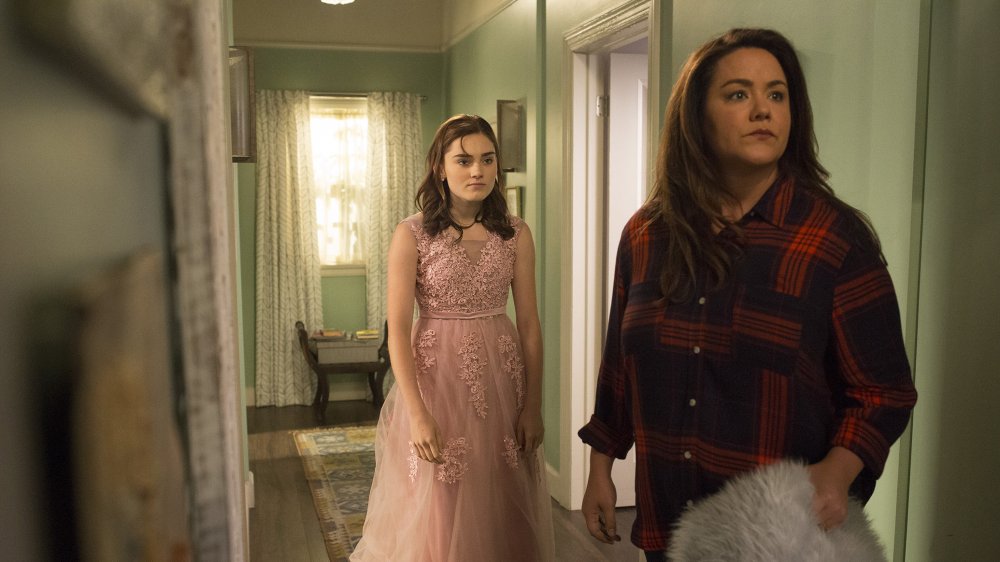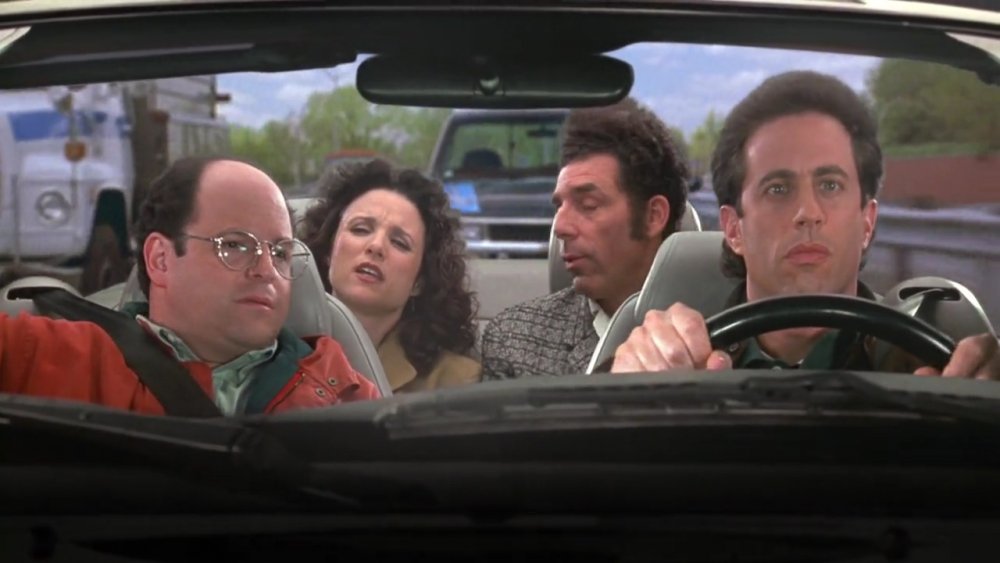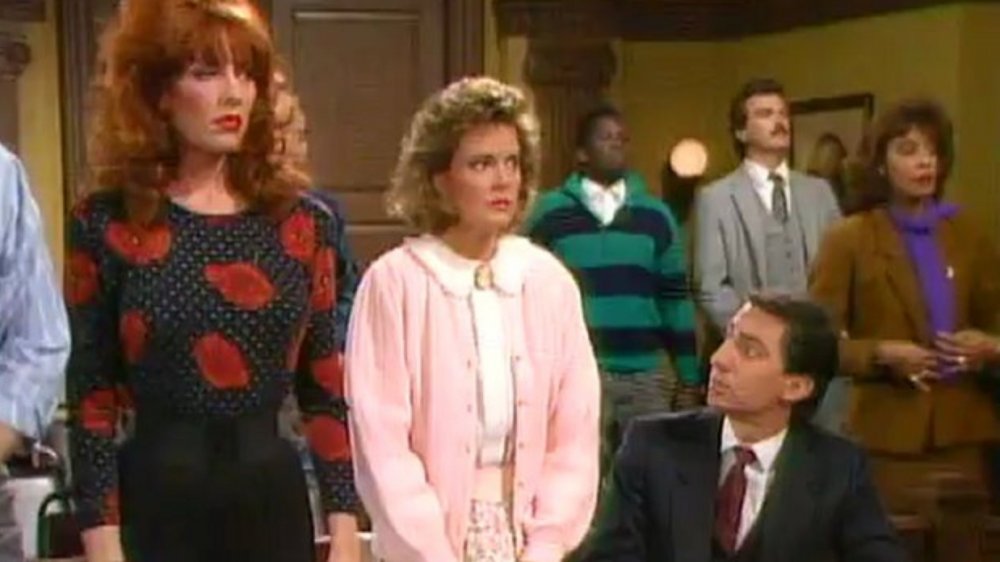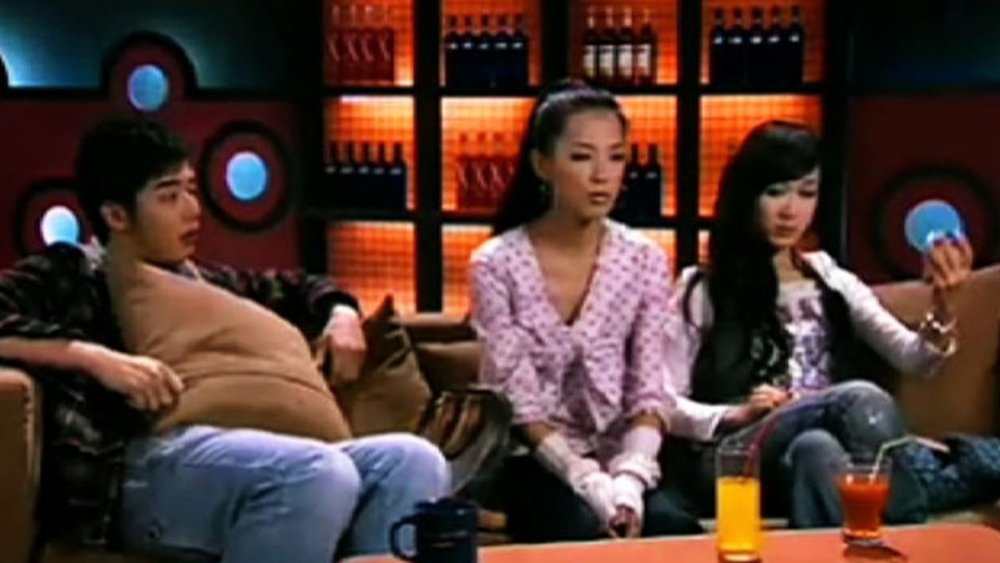Sitcom Moments That Went Too Far
"Too far" is something of a subjective designation in any art form, especially in comedy. Humor is often meant to push boundaries, and uncomfortable bits are often hard to watch because they contain truth. There's value to shock humor, and if that's not your thing, then there's plenty of content out there for you. Sitcoms are among the oldest forms of TV programming, and with a history that extensive, there are bound to be some unfortunate or distasteful moments.
There are times, however, where "too far" is entirely quantifiable, especially on sitcoms where a bad joke can land a lot of people in trouble. It's not just jokes, though — TV is a complex medium, and there are other ways to step on toes. Sometimes, it's not consulting vulnerable people before making a joke, and other times, it's bad behind-the-scenes decisions coming to the forefront. Here are times sitcoms messed up, usually resulting in an apology.
The Odd Couple accidentally insults Bosnian War victims
It's hard to imagine any edition of The Odd Couple going too far, much less the 2015 remake series. The show's not exactly clean, but it's hardly tawdry, either. But go too far it did — with a throwaway joke that caused a mess too big for even Felix to clean.
The second-season episode "From Here to Maturity" sees Felix ask a woman on a date to a Serbian restaurant called "A Taste of Srebrenica." He mangles the pronunciation and goes on with his bit. Odds are the writers just picked a Serbian name at random, but they picked the worst one they could have chosen. Srebrenica lies within Republika Srpska, an entity of Bosnia and Herzegovina. During the Bosnian War in 1995, it was the location of the Srebrenica massacre — over 8,000 Bosniak men and boys were systematically killed by the Serb army in what has since been labeled a genocide.
Bosnians in Europe and North America did not take kindly to Srebrenica being turned into a joke, as reported by RFE/RL. The Congress of North American Bosniaks compared it to calling a German restaurant "A Taste of Auschwitz." Local media in Bosnia itself condemned the joke, labeling it a primitive insult. The Odd Couple's executive producer eventually released a statement to RFE/RL, saying, "We were unaware of any connection to the terrible tragedy in Srebrenica. We would never intentionally disrespect or make light of such an event and sincerely apologize to anyone we may have offended."
Home Sweetie Home angers K-pop fans
Home Sweetie Home is a Philippine sitcom airing on ABS-CBN about a newly married couple navigating the needs of their new household. It's a simple enough premise, one that hardly seems capable of crossing any major lines. That was true until it incurred the wrath of one of the most powerful forces in the world today: K-pop stans.
During a scene broadcast on December 22, 2018, a man asks a group of girls if seeing K-pop group Super Junior is on their "Seoul Bucket List." The girls recoil in disgust, saying that Super Junior are old hat, and everyone's about BTS now. This was meant to show that the girls were "with it," whereas the man was out of touch. Instead, the show kicked up a huge controversy.
The backlash was immediate, as reported by ABS-CBN. #RespectSuperJunior and #ApologizeToSuperJunior trended on Twitter as fans expressed their disgust. Fan groups wrote open letters demanding a public apology. One of the most prominent voices objecting to the joke was Happee Sy of Pulp Live World, the promoter who brought Super Junior to Manila for a concert earlier that year.
That night, Home Sweetie Home issued an apology on their Facebook page. They paid respect to Super Junior as one of the first groups to open up K-pop to the Philippines. "We intended to establish their seniority," they said about the line of dialogue, "but we admit that we should have used better terms to say it." The three actresses in the scene each issued their own apologies as well.
How I Met Your Mother messed up a kung fu homage
The Slap Bet episodes of How I Met Your Mother are among the series' best. "Slapsgiving 3: Slappointment in Slapmarra" from the final season was the exception — and it crossed some lines that required an apology.
The episode features Marshall telling the story of how he learned the "Slap of a Million Exploding Suns" to Barney. The story is portrayed in the style of a kung fu movie, where he refines his skill with several different masters. Each time, he'd enter a Chinese restaurant and learn from one of his friends dressed in Chinese attire. Each character had heavy makeup — and, in Ted's case, a Fu Manchu mustache — though they stopped just shy of skin-changing makeup.
Shortly after the episode, #HowIMetYourRacism trended on Twitter. Even without actual face paint, it was a form of yellowface that featured Asian characters in token roles and the white cast in Asian garb. Some, including Time, argued that it was also emblematic of a show seriously lacking in any kind of Asian representation.
HIMYM co-creator Craig Thomas later issued an apology via Twitter. He said (via E!) "we set out to make a silly and unabashedly immature homage to Kung Fu movies, a genre we've always loved. But along the way we offended people." He thanked everyone who spoke up, admitted they "fell short" in their goal to make a universal show, and "hope[d] we can regain your friendship, and end this series on a note of goodwill." Yeah, about that ending and goodwill...
American Housewife picked on a neighboring town too much
American Housewife, ABC's sitcom about an imperfect family in aggressively perfect Westport, Connecticut, mocked the nearby city of Norwalk relentlessly for its first two seasons. Norwalk was referenced as a dirty, unsophisticated, unintelligent town. Standard fare in a vacuum — every show about a town needs a Shelbyville. This, however, was not made in a vacuum or even anywhere all that fictional. Norwalk is an actual place where real human beings live, and a TV show making fun of them was, per The Hour, making their lives more difficult.
The scene that officially pushed the joke too far occurred in late November 2017: One of the characters dressed up as "pregnant Norwalk Prom Girl." Several politicians and civil leaders from Norwalk — including the school superintendent, the mayor, and the state senate majority leader — separately reached out to ABC and told them to stop mocking the town. The Hartford Courant published an editorial telling ABC that their jokes weren't funny.
Between the politicians, the press, outraged citizens, and just generally bad social media buzz, ABC had to apologize. They emailed a statement to the Courant, saying that "American Housewife isn't intended to offend anyone. We've heard the concerns of the people of Norwalk and have made the decision to omit any mentions of the city from future episodes."
Big Mouth defines pansexuality incorrectly
It's hard to say that Big Mouth goes too far, because its whole raison d'être is to push boundaries in the name of sex positivity. Yes, it's an animated show about middle schoolers exploring their sexuality, but it's also frank and honest about sexuality in a constructive way. There was, however, one time they missed the mark and had to apologize.
Season 3 saw the introduction of Ali, a pansexual girl played by Ali Wong. When asked to explain the difference between bisexuality and pansexuality, she said that "being pansexual means my sexual preference isn't limited by gender identity." She elaborated that while bisexuals like "tacos" or "burritos," pansexuals "could be into a taco that was born a burrito, or a burrito that is transitioning into a taco."
This scene was shared on @NetflixIsAJoke, Netflix's comedy account. It almost immediately caused controversy, as reported by ET Canada. Sexuality and labels are a complicated topic, but many pointed out that saying bisexual people don't date transgender people is inaccurate and irresponsible.
Big Mouth co-creator Andrew Goldberg took to Twitter and offered an apology on behalf of the show. "We missed the mark here with this definition of bisexuality and pansexuality," he said, "and my fellow creators and I sincerely apologize for making people feel misrepresented." He acknowledged that, while defining sexuality is challenging, they could have done better. He thanked everyone for speaking up and said they'd address it in future seasons. @NetflixIsAJoke deleted their tweet as well.
Seinfeld angered Puerto Ricans in one of its final episodes
Despite dealing with a lot of contentious material, Seinfeld was a largely uncontroversial show. Toward the end of its run, though, it misfired in an episode about a New York institution.
"The Puerto Rican Day" sees the gang leave a Mets game early to beat traffic, only to end up stuck behind the Puerto Rican Day Parade. Toward the end of the episode, Kramer accidentally sets a Puerto Rican flag on fire and stomps on it to put the fire out. He gets chased by a mob of angry Puerto Ricans. Later, Jerry's car gets damaged as a result, and Kramer says, "It's like this every day in Puerto Rico!"
Seinfeld's Puerto Rican audience did not take kindly to any of this. The president of the National Puerto Rican Coalition called (via The New York Times) the flag-burning scene in particular an "unconscionable insult." Fernando Ferrer, the Bronx Borough president and a Puerto Rican himself, said the show "crossed the line between humor and bigotry" and found the "every day" line disrespectful. The New York Daily News also reported angry letters, calls, and protests outside 30 Rock.
NBC offered an apology, stating that "the humor is derived from watching the core group of characters get themselves into difficult situations" and not any actual hatred but acknowledging that they'd accidentally offended people. They only picked the Puerto Rican Day Parade because it intersected with baseball season. The episode was removed from syndication until around 2002, per the New York Post, when the furor had died down.
YG Future Strategy Office offends both Chinese viewers and K-pop fans
YG Future Strategy Office is a mockumentary sitcom about a fictional office in real-life Korean entertainment giant YG Entertainment. It stars K-pop star Seungri heading up a new division at his company: the titular Future Strategy Office, a place YG banishes the misfits and troublemakers to. The show was inspired by the many scandals plaguing the K-pop industry but caused some controversy itself by pushing some limits — and foreshadowing the biggest crisis K-pop ever faced.
The shows features many K-pop acts performing as variations of themselves, often crossing lines that made the viewing audience uncomfortable (via Korea JoongAng Daily). Scenes that brought backlash include Seungri's bodyguard asking Blackpink to sign his bare back and Seungri forcing a new model to strip on a webcam to talk with a foreign investor. YG FSO alienated Chinese fans on at least two occasions, a country that has a frayed relationship with K-pop. One scene showed a map with a picture of China that excluded parts of the country. Another showed two Korean security guards in Chinese clothing captured, with one of them yelling "I am a pig!" Chinese fans flooded the Instagram of YG CEO Yang Hyun-suk, who apologized, per The Korea Times.
Seungri's involvement also made the show age like milk, especially the scene with the new model. Mere months after YG FSO debuted, Seungri became the central figure in the Burning Sun scandal – one that involved violence, bribery, drug distribution, and sex trafficking.
Louie's "Pamela Part 1" is hard to watch in retrospect
Many episodes of Louie were outright cringeworthy, which was intentional. Louis C.K.'s self-deprecating, self-pitying, and often lewd humor translated to a show where audiences winced — but one scene was rough back then and only became harder to watch after we learned about Louie's past.
The scene in question happens toward the end of "Pamela, Part 1." Louie, after a heartbreak, comes home to find Pamela — a frequent object of his affections — asleep on his couch. When she tries to leave, he grabs her and forces her to stay. A scuffle ensues, during which Pamela repeatedly objects before saying that "this would be rape if you weren't so stupid" before Louie can do anything else.
The scene kicked up a stir when it first aired in 2014, with numerous publications offering numerous takes. Most agreed (via Time) that it was viscerally uncomfortable, clearly by design, but there was less agreement over whether it was executed well. Actress Pamela Adlon herself recognized that it would make people uncomfortable, while noting that it portrayed Louie as the bad guy.
As with the rest of Louie's career, the scene got reevaluated after he admitted to years of sexual misconduct. Vulture ran an article saying the whole episode now "plays like a 21 minute confessional." They highlighted how the scene bore an uncanny resemblance to how Louie's accusers said he cornered them. Other scenes throughout the episode were given a second look, including a stand-up bit where Louie says women were "too mean."
Married... with Children had an episode banned for going too far
When Fox first tried to make a name for itself as a fourth network, it promised edgier content than the safer Big Three were offering. Married... with Children was, for many years, the centerpiece of that promise. One episode went too far for the censors' liking, though, and wasn't aired until over a decade past its planned airdate.
"I'll See You In Court" was often called the "lost episode" of Married. The episode sees Al and Peg try to rekindle their love life by getting intimate in new locations, only to find out that the motel they stayed at recorded them. They take the motel to court, along with the Rhoadeses, for making sex tapes without their consent.
In a 1990 interview with Playboy, executive producers Ron Leavitt and Michael G. Moye laid bare how the episode got banned: Married was already on notice after anti-obscenity activist Terry Rakolta started a one-woman campaign against the show that saw several advertisers pull out. When they sent "I'll See You In Court" to the censors, they got 15 notes — far more than usual. Leavitt and Moye fought with the censors but ultimately decided not to air "I'll See You In Court."
The episode remained unaired until 2002, when it played on FX and reentered some syndication packages. It was also included in a DVD collection of Married's craziest episodes, but times had changed: Website DVD Verdict stated, "what was once irascibly ribald in 1989 is now so sedate as to be comatose in 2003."
iPartment keeps plagiarizing
iPartment is a popular Chinese sitcom about a group of twenty-something friends living around each other in the city. If that sounds familiar, it's because that describes a good chunk of the sitcom market ... and also because the show probably plagiarized a few of their storylines.
The show made worldwide headlines in 2012 after it was accused of stealing jokes from American sitcoms. Videos circulated comparing jokes on iPartment to jokes from How I Met Your Mother, Friends, and The Big Bang Theory. A spokesman for the show responded to these accusations by saying that, while they were inspired by American sitcoms, they were more homages or just genre tropes. "Comedies have stereotypes," he said to various UK newspapers, "like the handsome man, the gorgeous woman, the cheap man and so on." Many of their jokes were inspired by "various sources."
There's a certain truth to that. We've heard countless sitcoms pitched as the next Friends. What makes this claim less credible, however, is that they also issued an apology to an unnamed screenwriter for using his jokes without permission and offered him financial compensation.
The world moved on and forgot about these accusations ... until January 2020, when the show was outright caught plagiarizing another storyline. The producers issued a statement, which, per Pandaily's translation, said they conducted an internal review and "confirmed the error due to a lack of supervision" before apologizing and reworking the show to change the plot. They also apologized to Old Tomato, a Chinese vlogger who accused them of stealing his work.
Too many sitcoms used blackface
The worldwide reckoning with racism over the past few years, especially the wave borne out of the George Floyd protests, hit Hollywood hard. It raised a point a lot of us kind of knew but seldom grappled with: Holy hell, there's been a lot of blackface on TV in the past 25 years. Blackface isn't just for minstrel shows in the past — we've been watching it on our TV screens for years, often to minimal mainstream controversy upon original airdates.
Many showrunners, writers, actors, and producers apologized, often saying some variation of "it wasn't right and I regret doing it." More than a few executive producers and networks pulled episodes containing blackface from streaming services. Vulture kept a running list of episodes that got yanked, and it includes episodes of everything from Community to Scrubs to It's Always Sunny in Philadelphia.
There's admittedly some nuance to a few of these — many of them have characters wearing blackface to portray them in a negative light, like Jon Hamm's Amos 'n' Andy riff in 30 Rock's "Live from Studio 6H" — but it's still an uncomfortable and alienating subject. Debate continues about whether pulling the episodes is the correct course of action or whether they should be kept up with added context, but at least an honest conversation is finally being had.
